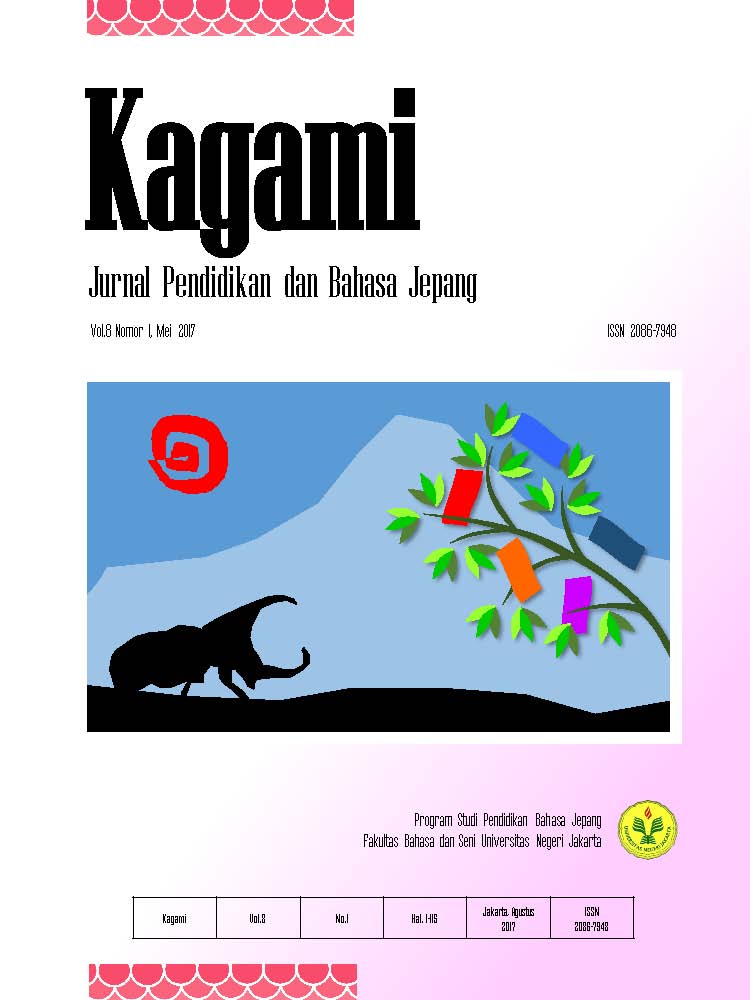Kotowaza in Cognitive Linguistic Analysis: The Use of Metonymy
Keywords:
Kotowaza, Japanese Proverb, Cognitive Linguistic, MetonymyAbstract
This paper analyzes kotowaza using metonymy through the study of cognitive linguistic. The background of this research is the difficulty of understanding the correlation between the meanings of the kotowaza on foreign learners because of cultural differences and lack of dictionaries that support the process of understanding kotowaza deeply.
The purpose of this research is to understand kotowaza deeply, determine the correlation between lexical and figurative meaning of Japanese proverbs using metonymy based on the study of cognitive linguistics. The method used is a qualitative method in approach of cognitive linguistics. At the end of the study, it was concluded that the metonymy that can be used to analyze the correlation between lexical and figurative meaning of proverbs are causality metonymy and method-purpose metonymy. Meanwhile, the proverbs that can be analyzed using a metonym associated with the brand and nicknames are not found.
References
Garrison, Jeff. 2002. Basic Japanese Idioms. Kodansha International.
Kaneko, Takeo. 1982. Nihon no Kotowaza 1. Tokyo: Umitsubame Shobou.
. 1982. Nihon no Kotowaza 2. Tokyo: Umitsubame Shobou.
Kawase, Ikuo. 1996. Nihongo Chukyuu II. Tokyo: Bonjinsha.
Keraf, Gorys. 2010. Diksi dan Gaya Bahasa. Jakarta: PT. Ikrar Mandiriabadi.
Lakoff, G & Johnson M. 1980. Metafora We Lived By. Chicago: The University of Chicago Press.
Momiyama, Yosuke. 1997. Kanyouku no Taikeitei Bunseki, Inyu, Kanyu, Teiyu ni Motozuku Kanyouku no Imi no Seiritsu o Chushin dalam Nagoya Daigaku Kokugo Bungaku, No. 80 Nagoya Daigaku Kokugo Bungakukai.
Shinmura, Izuru. 1973. Koujien. Tokyo: Iwanami Shouten.
Sutedi, Dedi. 2008. Dasar-dasar Linguistik Bahasa Jepang. Bandung: Humaniora.
2009. Penelitian Pendidikan Bahasa Jepang. Bandung: Humaniora
Yohani, Adisthi Martha. 2008. Peribahasa Jepang Empiris. Program Sarjana Jurusan Sastra Jepang Fakultas Sastra Universitas Padjadjaran (tidak dipublikasikan)
Yulianie, Astie. 2006. Analisis Komparatif Peribahasa Jepang dengan Peribahasa Indonesia yang Berhubungan dengan Mata. Program Sarjana Jurusan Sastra Jepang Fakultas Sastra Universitas Padjadjaran (tidak dipublikasikan)
http://soundcloud.com
http://kotowaza-allguide.com





